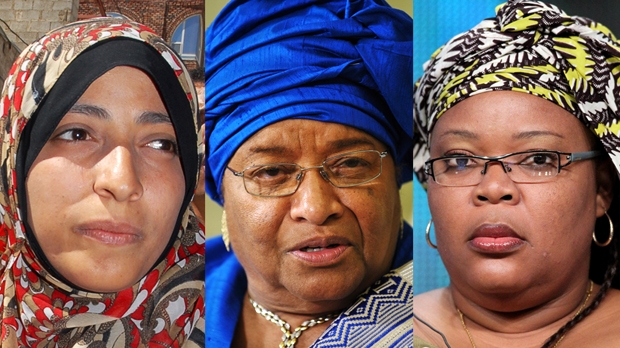Three women share Nobel Peace Prize
A victory for the struggle for womens’ rights: three peace and democracy activists are awarded this year’s Nobel Prize for Peace.

In a year when the fight for democracy and civil rights has shaken the world – the Nobel committee said that Liberian president Ellen Johnson Sirleaf, along with her compatiot Leymah Gbowee, and Yemeni activist Tawakkol Karman would share the $1.5m award “for their non-violent struggle for the safety of women and for women’s rights to full participation in peace-building work.”
African achievements
Johnson Sirleaf, who is a Harvard educated economist known as Liberia’s “Iron Lady”, became Africa’s first democratically elected president in 2005 – and faces election to a second term next week. In office, she has managed to negotiate substantial debt relief for the country, started an investigation into official corruption, and set up a truth and reconciliation commission to address crimes committed during the civil war. She has sharply increased the number of girls in education, while there are more women in politics and other influential posts.
Mass peace movement
Gbowee, a social worker and trauma counsellor, who’s worked with former child soldiers, mobilised a mass campaign by women to bring an end to Liberia’s civil war. “If any changes (are) to be made in society”, she said, “it had to be by the mothers”. Her movement began with women praying for peace – and managed to persuade African leaders to put pressure on the warring factions and return to peace talks. She also mobilised women to vote in Liberia’s presidential elections, helping to bring Ellen Johnson Sirleaf to power.
Ms Johnson Sirleaf said they both accepted the award on behalf of the Liberian people – calling it a recognition of the country’s “many years of struggle for justice, peace and promotion of development”.
If any changes were to be made in society, it had to be by the mothers. Leymah Gbowee
And 32-year-old journalist Tawakkol Karman, who has three children, is one of Yemen’s best known opposition activists. She helped to organise the first protests against President Saleh at Sana’a University and has been sent to prison three times over her campaigns. She called the Peace Prize was a victory for the protest movement and said the fight for a “democratic, modern Yemen” would continue until all civil rights were won.
Surprise winners
Insiders had expected this year’s award to go to pro-democracy bloggers and dissidents in Egypt and Tunisia, while other potential favourites included the US army whistleblower Bradley Manning and even Facebook founder Mark Zuckerberg. Egyptian blogger Wael Ghonim described Ms Karman’s win as “well deserved” – and said the real prize was for their countries to become more democratic and respectful of human rights.
Women cannot be set aside. Thorbjoern Jagland, Chair, Nobel Committee
The Nobel committee chairman Thorbjoern Jagland told reporters in Oslo that the award was a signal to the whole Arab world that women could not be “set aside” in the struggle for democracy. And, he said, there would be no lasting peace throughout the world unless women achieved the same chance as men to influence all levels of society.
